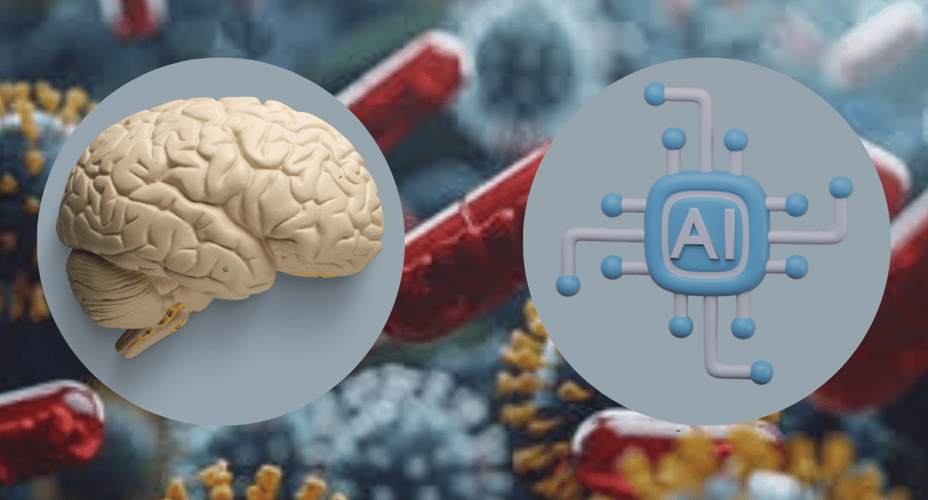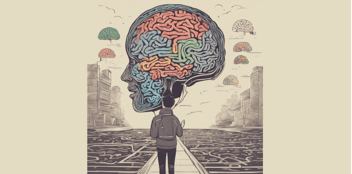Artificial intelligence helps identify the hidden triggers of mental health problems: how viruses, bacteria, and antibiotics impact our minds
- Home
- Blog

In my practice at Potomac Psychiatry, I’ve observed a growing number of patients experiencing significant mental health issues that seem to arise from seemingly unrelated physical health problems. Specifically, elevations in antibodies to viruses such as Epstein Barr Virus (EBV), Herpes Simplex Viruses (HSV), Mycoplasma pneumoniae, and Streptococcus, as well as mental health disturbances following antibiotic use, are surprisingly common. These patients often report symptoms including depression, anxiety, panic attacks, and fatigue. Here, I explore the mechanisms by which these infections and medications can trigger psychiatric problems, and how AI has been instrumental in helping us understand and address these complex interactions.
The role of infections in mental health
Viruses and bacteria: the culprits
- Epstein barr virus (EBV) and herpes simplex viruses (HSV)
- Mechanism: Both EBV and HSV can cause systemic inflammation and neuroinflammation. These viruses can cause the release of inflammatory molecules that cross the blood-brain barrier and directly infect neural tissues, leading to an inflammatory response that disrupts normal brain function.
- Impact: This can result in neuropsychiatric symptoms such as depression and anxiety. Elevated antibodies to these viruses indicate an ongoing or reactivated infection that could be contributing to these mental health issues.
- Mycoplasma pneumoniae and streptococcus
- Mechanism: Infections caused by Mycoplasma pneumoniae and Streptococcus can lead to immune system dysregulation. Streptococcal infections, for example, are associated with Pediatric Autoimmune Neuropsychiatric Disorders Associated with Streptococcal infections (PANDAS) in children, which can cause sudden onset of psychiatric symptoms.
- Impact: These infections can cause persistent inflammation, autoimmunity, and disruptions in the gut-brain axis, leading to chronic mental health issues like anxiety and depression.
Antibiotics: the double-edged sword
- Ciprofloxacin and other antibiotics
- Mechanism: Antibiotics like ciprofloxacin can directly impact mental health through several mechanisms. They can cause disruptions in the gut microbiome, leading to a decrease in beneficial bacteria and an overgrowth of pathogenic bacteria. This dysbiosis can result in the production of neuroactive compounds that affect brain function.
- Impact: The gut-brain axis is crucial for maintaining mental health, and disruptions here can lead to symptoms such as depression and anxiety. Additionally, some antibiotics can directly affect the central nervous system, leading to neuropsychiatric side effects.
Mechanisms of causation of these psychiatric problems
- Systemic inflammation
- Infections trigger systemic inflammation, releasing cytokines and other inflammatory mediators into the bloodstream. These can cross the blood-brain barrier, leading to neuroinflammation and altered brain function.
- Brain inflammation
- Direct infection of the brain or an infection-triggered autoimmune response can cause inflammation within the brain. This neuroinflammation disrupts neural pathways and neurotransmitter balance, contributing to psychiatric symptoms.
- Gut microbiome disruption
- Antibiotics and infections can cause significant changes in the gut microbiome. A healthy gut microbiome is essential for producing neurotransmitters like serotonin and dopamine and for maintaining the integrity of the gut-brain axis. Dysbiosis can lead to increased gut permeability (“leaky gut”), allowing inflammatory substances to enter the bloodstream and reach the brain, where the blood-brain-barrier (the “BBB” – that protects the brain from certain harmful substances in the blood) can be compromised, creating a portal for these inflammatory substances to enter the brain.
- Direct side effects of antibiotics
- Some antibiotics can cross the blood-brain barrier and have direct neurotoxic effects, leading to symptoms such as anxiety, depression, and cognitive disturbances.
The role of AI in unraveling complex interactions
At Potomac Psychiatry, we leverage AI to help understand and address these complex interactions between physical and mental health in our practice of Root Cause Psychiatry™. By inputting multiple data points—such as genetic markers, blood and stool biomarkers—into our AI system, we can generate insights into potential underlying causes of mental health problems and suggest additional diagnostic tests and treatment options.
Case study examples
- Young adult with dysregulated cortisol and chronic depression
- Problem: A young adult patient presented with low daytime cortisol and high nighttime cortisol, along with chronic depression and fatigue following a COVID infection.
- AI Insight: The AI suggested testing for a reactivation or possible reinfection by viral and bacterial infectious agents and potential autoimmune markers. It also recommended adjusting the patient’s treatment plan to address the underlying inflammation and circadian rhythm disruption.
- Outcome: This approach led to a more targeted treatment plan, significantly improving the patient’s symptoms.
- Complex case with bipolar disorder and multiple sclerosis
- Problem: A patient with bipolar disorder, multiple sclerosis, and chronic pain was experiencing suboptimal response to ketamine treatment.
- AI insight: The AI analyzed potential interactions between the patient’s medications and suggested alternative mood stabilizers that would not interfere with ketamine and that also possessed anti-inflammatory properties.
- Outcome: Switching to the recommended mood stabilizer resulted in improved mood stability and enhanced response to ketamine.
AI elevates root cause psychiatry™ to a new level of expertise
Understanding the intricate ways in which viruses, bacteria, and antibiotics can influence mental health is crucial for developing effective treatment plans for complex patients. The integration of AI in our practice has been transformative, providing us with the tools to uncover hidden connections and tailor treatments to each patient’s unique needs. At Potomac Psychiatry, we remain committed to leveraging the latest technology to improve patient outcomes and advance our understanding of the root causes of psychiatric disorders.
For more insights and personalized care, visit our website or schedule a consultation.
.png?width=144&height=144&name=Untitled%20design%20(34).png)

.jpeg?width=352&name=AdobeStock_517132756%20(1).jpeg)

